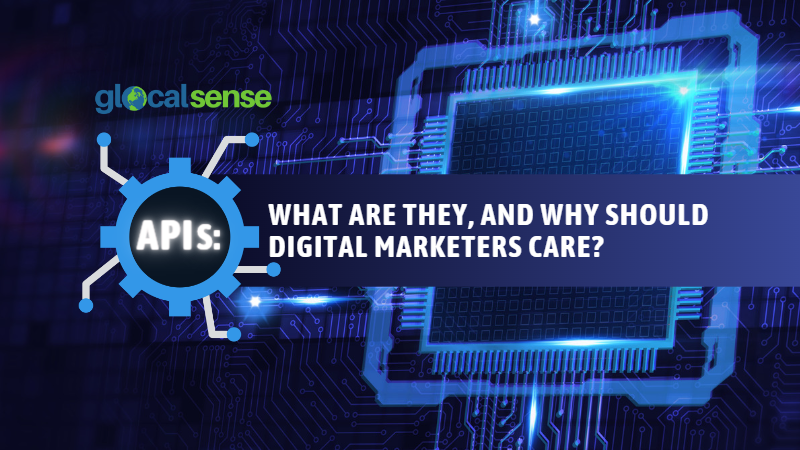In this growing technological era, Application Programming Interfaces (APIs) have become important in our daily apps. They act as an interface between web servers and applications by processing huge volumes of data with high flexibility to cater to the needs of customers and businesses. Constant availability for the public and rapid growth in terms of features make API more business centric. The need for API varies for the business and customers. Hence, there is a need to build a strategy to design, implement and support a product using API to sustain in the marketplace and increase the conversion rate.
What is API?
Application programming interface (API) acts as a communication bridging tool between two different software by sending the requests and responding according to the functionality discussed in the interface document.
How does API work?
API works based on the client and server. An application that sends the request is called a client. The application which receives the responses is called a server. First, the client software or application will call API by sending the valid request, which will be processed by a Uniform Resource Identifier (URI) to a web server. The server, in turn, sends a response to the request with valid data and is transferred to the main application through API. The details regarding when the API must be available, what it will offer, legal aspects, and limitations will be signed as a part of the contract between the companies.
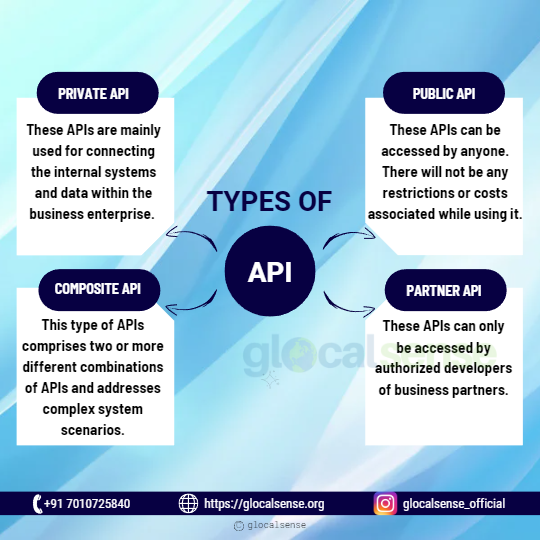
Types of API
Based on the architecture and scope of use, the APIs are broadly classified into the following types:
Private API: These APIs are mainly used for connecting the internal systems and data within the business enterprise.
Public API: These APIs can be accessed by anyone. There will not be any restrictions or costs associated while using it.
Composite API: This type of API comprises two or more different combinations of APIs and addresses complex system scenarios.
Partner API: These APIs can only be accessed by authorized developers of business partners.
APIs connect – Bridging the gap between marketing and technology
Marketing is one of the critical components of any business. Technology and marketing tools are constantly evolving to sustain the competitive business environment by adapting to the latest technological developments. API has become part of most industries either as an external API or as companies’ own internal API. For digital marketers, APIs help minimalize campaigning efforts by easily connecting to multiple digital marketing platforms.
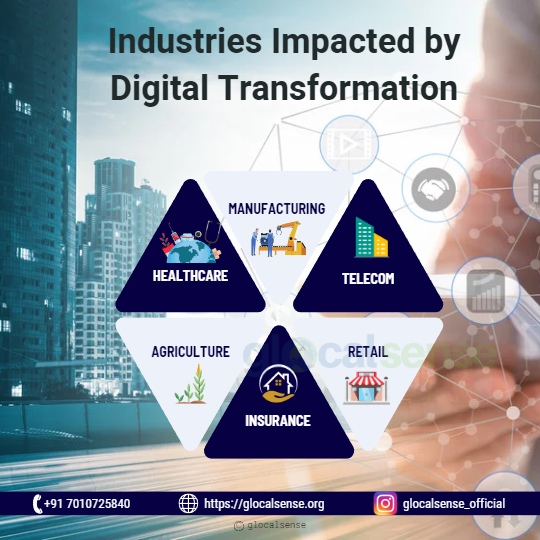
Impact of APIs in today’s digitalized organization via Digital Transformation
Digital transformation has now made a significant change in creating organizational value. Digital transformation impacts every industrial sector, like healthcare, manufacturing, telecom, retail, insurance, and agriculture, making way for new business models. This transformation involves the basic changes in the organization’s mindset and values to re-modeling the process.
In recent decades, API has drastically impacted organizations for digital transformation. Here are the reasons why the APIs introduction into the business helps in digitalization transformation:
Flexibility: API provides the most flexibility while offering the content or service than a normal website or RSS feeds. It helps the organization share the content when, how, and in what terms within given control, meeting customer needs.
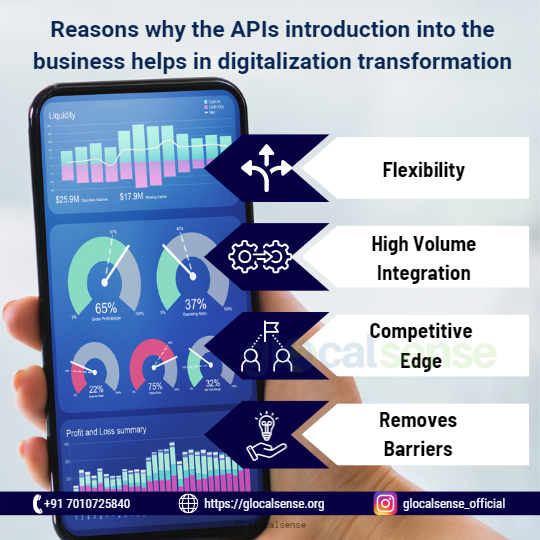
High Volume Integration: API plays an important role between customer and business by comprehending a huge data set.
Competitive Edge: If one company has introduced API into the product, then the rest of the companies in the industry will follow it. Hence the companies work continuously to improve them and stand out from the crowd.
Removes Barriers: API removes barriers from experimentation.
Why APIs is important for digital marketers?
• For digital marketers, attracting new clients by offering a unique experience, retaining the existing customer, and increasing the conversion rate of the new customer becomes more important.
• Marketers must take a big leap from the usual channel to the ecosystem and extract data from multiple sources to target the niche customer. They must be more flexible and gather strategic data to gain insights across channels like social media, web, mobile apps, etc.
• API can exchange data between the apps, whether web, VR, social media, or something else, giving access to act quickly at any scale.
What new API-driven creations, innovations, and collaborations could benefit your customers?
Recently, API-based development has become a trend in which the API gets developed first, and then the application development follows suit. This development model reduces the gap in the functionality to be included in the application and helps avoid incompatibility with cloud-friendly APIs. Also, the following are a few examples of API innovations that benefits the customer.
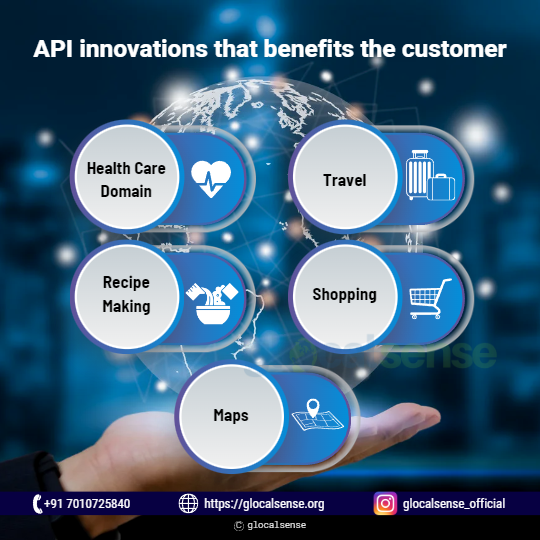
Health Care domain: Through API, IBM hopes to create multiple new ecosystems that will allow it to explore newer markets. One among them is oncology care. IBM now provides physicians and nurses with information about the symptoms, diagnosis, and treatment methodologies. Further, it is expected to expand the solution to retrieve data on oncology, worldwide specialists, and hospitals.
Travel: Travel API helps customers to find the best deals for booking flights, hotels, cab services, packages, and desired travel itineraries.
Recipe Making: API helps reach the nutritionist, their recipes, general recipes, and even customers to have a wide variety of recipes.
Shopping: API helps in online shopping, knowing the availability of products and their trend, comparing prices, getting reviews and returning defective products, and many more.
Maps: Google has developed various APIs to guide directions to multiple locations, road maps, convert between coordinates and addresses, time zone data, and many more.
What could APIs do as part of a digital marketing mission?
The main mission of Digital marketing should ensure that the products or services reach the customer and make good demand for the product. To achieve this, it is first important to understand the customer, their potential gain, and the pain point. Digital marketing makes use of different applications to manage their campaigns. Some companies use different combinations of products to meet their goals. APIs help to save a lot of time, ease the integration process and automate a few of them. Let’s walk through how API could be part of digital marketing operations in an efficient manner.
Automating the Tasks: The marketing process involves repetitive and time-consuming tasks. API helps automate these tasks by using readily available data, connecting directly to various systems, and improving performance. Above can be done by using different providers’ APIs to create new features. This automation not only reduces the workload but also reduces the cost incurred by additional human resources.
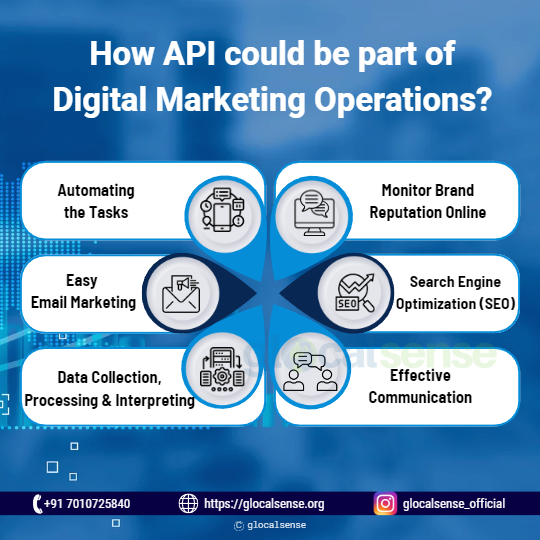
Easy Email Marketing: As a part of digital marketing business strategy, it becomes important to stay connected with existing customers by notifying them the new offers, transactional messages, or newsletters. API helps send notifications to customers when they start using the website, verification code, upcoming events and offers. While sending a transactional message, the APIs enable the creation of personalized receipts and integrate with the website’s functionality. They also help to execute different campaigns based on the customer’s buying journey and encourage them to buy new products.
Data Collection, Processing, and Interpreting: It is important to analyze the end users to increase the reach of the product in the market and to know who they are and what they want. To achieve this, digital marketers categorize customers based on demographics and psychological and social factors. API helps in this process of data collection, segregation, processing, and interpreting data.
Monitor Brand Reputation Online: Increasing visibility positively leads to an increase in brand reputation. API helps identify negative feedback and turns unhappy customers into trustworthy ones. These types of APIs help to manage brand reputation.
Search Engine Optimization (SEO): Search Engine Optimization is used to optimize the technical configuration and increase the content relevance and popularity of the link so that the pages are easily fetched during search queries by ranking them. It becomes important for digital marketers to build a strategy to be better available to customers. API helps to enhance the SEO by automating the whole keyword search process, extrapolating the website data using web scraping and helps to validate the backlinks, and extracting the reports.
Effective Communication: Effective communication plays a vital role in increasing the conversion rate of customers. Keeping in contact with all the customers is quite challenging. API helps to stay in touch with all customers by automating messages, responding to grievances and feedback, and replying to comments and reviews.
Digital Marketer’s Strategies for APIs future change over
Consumers use different devices, social media, and various other applications to access the service and information needed for their day-to-day activities. Not only big companies but also many startups make use of the advantage of the data available to the API. API helps organizations expand into newer markets that have not been considered previously. Appropriate APIs can help in achieving all the below.
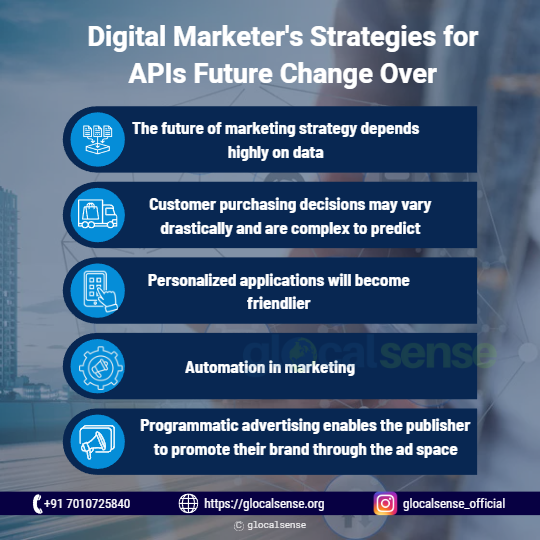
• The future of marketing strategy depends highly on data, so investing in data processing leads to long-term success. Marketers with more data don’t mean they have better customer insights. It is important to have quality data to be successful.
• Customer purchasing decisions may vary drastically and are complex to predict. The same consumer can simultaneously buy one product on the high end and one on the low end. It becomes important to plug in the digital component API to understand the purchasing decision of the consumer better.
• Personalized applications will become friendlier.
• Automation in Marketing.
• Programmatic advertising enables the publisher to connect to ad space and advertisers ready to promote their brand through the ad space.
